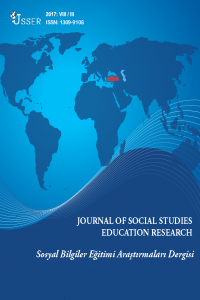The potential of folk tabletop games in the development of the intelligence and creativity of children
Öz
The modern education is dominantly targeted at the left hemisphere. It draws insufficient attention to the harmonization of the functioning of both brain hemispheres. This has a negative impact on the development of the abilities of children and is especially detrimental to boys and those children who are brought up in the natural environment. In this regard, one of the solutions is folk tabletop games, but their potential in the development of the intelligence and creativity of children has been insufficiently explored. The goal of the research is to identify and substantiate the potential of the Sakha’s tabletop games for the development of the intellectual and creative abilities of children aged 5-7 years. The scientific novelty of the research consists in the fact that the problem under study enriches the theoretical and methodological bases of using tabletop games in the intellectual development of children in preschool education. The study was carried out longitudinally. The following was studied: the influence of games on the development of intellectual, creative, and insight abilities of children aged 5-7 years, as well as their interconditionality. The obtained results are discussed from the point of view of their correspondence with both the data available in science and the hypothesis of the study. The discussion emphasizes that the tabletop games of the Sakha are the most meaningfully represented in the study as the functional space for the development of intellectual and creative abilities of children. In the conclusion, it is emphasized that folk tabletop games are the means for qualitative enrichment of all the basic factors of intelligence in operations, contents, and final products of thinking. The study has proven the idea of treating tabletop games as a substantial source of development of the harmonious activity of both brain hemispheres.
Ayrıntılar
| Bölüm | History Education |
|---|---|
| Yazarlar | |
| Yayımlanma Tarihi | 23 Kasım 2017 |
| Yayımlandığı Sayı | Yıl 2017 Cilt: 8 Sayı: 3 |


